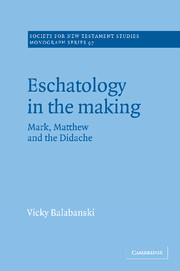Book contents
- Frontmatter
- Contents
- Preface
- List of abbreviations and note on texts
- Introduction
- 1 An imminent End? Models for understanding eschatological development in the first century
- 2 Matthew 25:1–13 as a window on eschatological change
- 3 Mark 13: eschatological expectation and the Jewish War
- 4 The Judean flight oracle (Mark 13:14ff) and the Pella flight tradition
- 5 Matthew 24: eschatological expectation after the Jewish War
- 6 Didache 16 as a development in Christian eschatology
- Conclusion
- Bibliography
- Index of modern authors
- Index of biblical and other ancient texts
- Subject index
5 - Matthew 24: eschatological expectation after the Jewish War
Published online by Cambridge University Press: 04 September 2009
- Frontmatter
- Contents
- Preface
- List of abbreviations and note on texts
- Introduction
- 1 An imminent End? Models for understanding eschatological development in the first century
- 2 Matthew 25:1–13 as a window on eschatological change
- 3 Mark 13: eschatological expectation and the Jewish War
- 4 The Judean flight oracle (Mark 13:14ff) and the Pella flight tradition
- 5 Matthew 24: eschatological expectation after the Jewish War
- 6 Didache 16 as a development in Christian eschatology
- Conclusion
- Bibliography
- Index of modern authors
- Index of biblical and other ancient texts
- Subject index
Summary
Let us now turn our attention to the eschatological discourse in Matthew's Gospel, of which one section (Matt. 25:1–13) has already been examined. The primary focus of this chapter will be upon the material that has direct parallels to Mark 13, as it provides the opportunity to examine the distinctive redactional and compositional techniques by which the evangelist appropriated and reshaped the Markan discourse. It is necessary to give attention first of all to the wider context in which this material is situated.
All scholars who accept Markan priority note that Matthew has significantly extended the eschatological discourse vis-à-vis the Markan source. J. Dupont notes that Matthew's last great discourse is almost three times as long as Mark's and Luke's, comprising ninety-four verses, as opposed to Mark's thirty-three and Luke's twenty-nine. The contrast between Matthew's eschatological discourse and those of Mark and Luke is even more striking when one considers that Dupont's reckoning only takes Matthew 24 and 25 into consideration, for there are weighty reasons for including chapter 23 as integral to Matthew's conception of this final discourse. I will therefore begin by considering the question of the status of Matthew 23; is it to be understood as the opening of the eschatological discourse, or rather as a separate discourse in its own right?
- Type
- Chapter
- Information
- Eschatology in the MakingMark, Matthew and the Didache, pp. 135 - 179Publisher: Cambridge University PressPrint publication year: 1997

